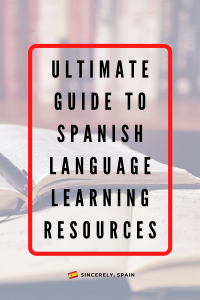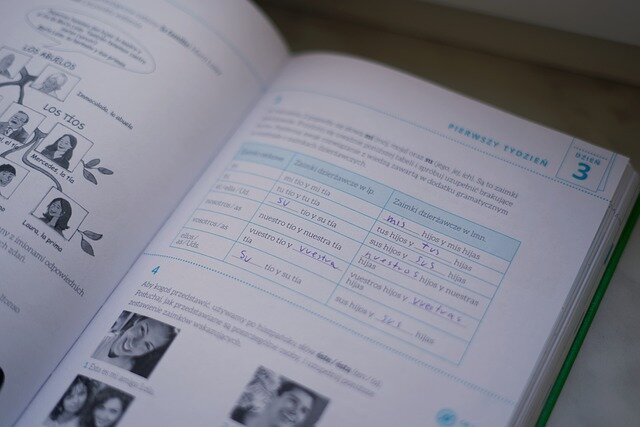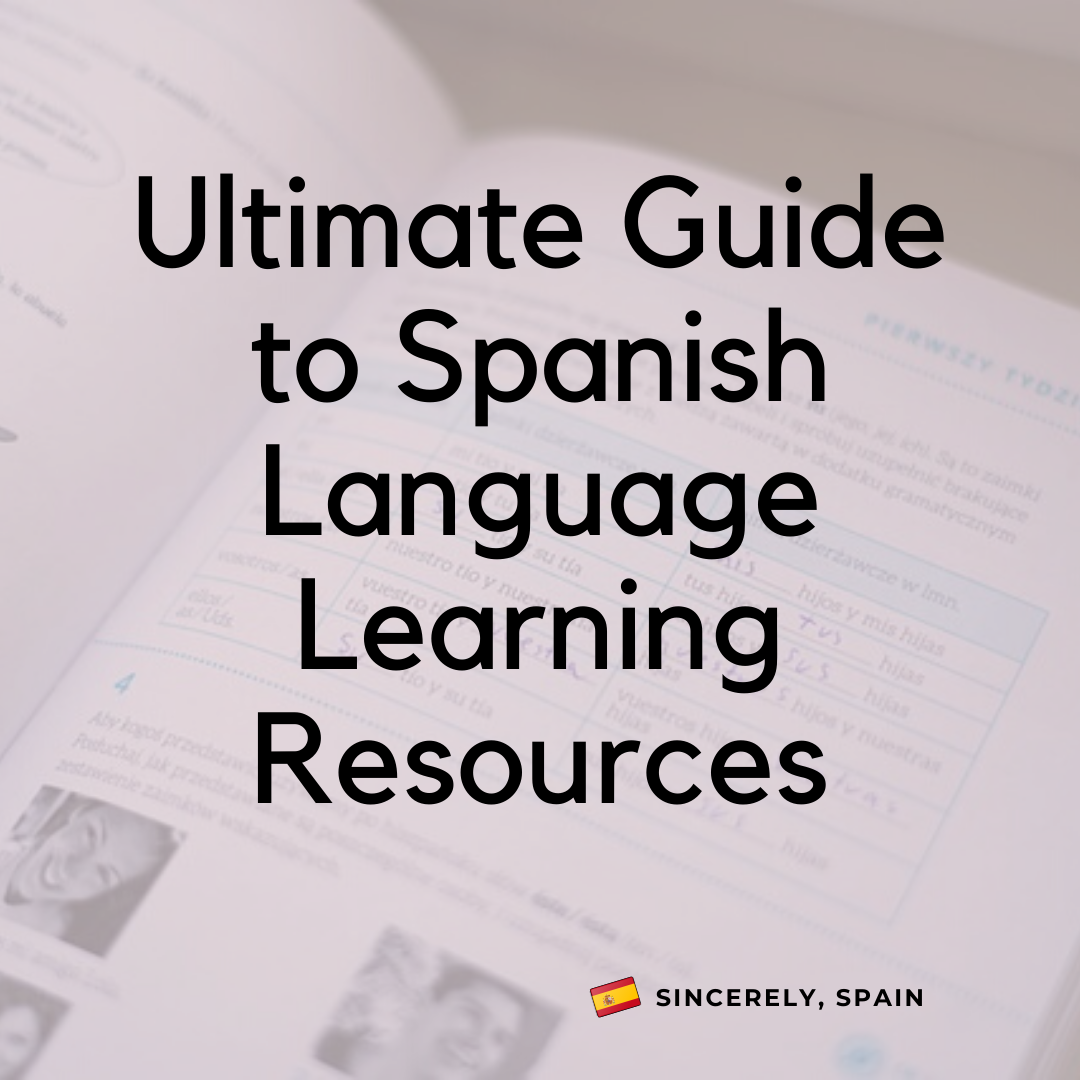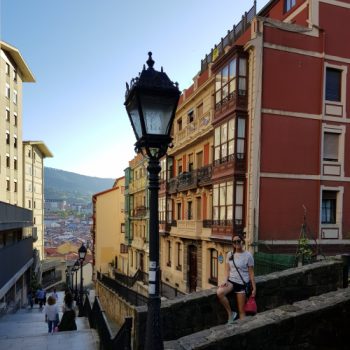
Ultimate Guide to Spanish Language Learning Resources

Dear Ashley,
We have posted loads over the years about language learning because we truly believe that it is something that isn’t always easy to do but it is worth while working on. In order to better organize this information for you, we have put together this resource page. We hope that this will help you find exactly what you are looking for and support you on your language learning journey.
Before we even start, we want to highlight why we think that language learning is important and the place that long term language has in your learning journey. What we say allows us to express many things but how we say things is almost as (if not more) crucial to our communication. And that is why we think language is so important, like we highlight in this post. At the same time, we believe that language learning is a journey and a process and it is not something that you develop overnight. That is why we highlight why and how you might want to dedicate more to your Spanish language journey than just six months abroad in this post.
We also want to share this post and video with you where we share our top three tips for learning Spanish. While you can see that we dive into many more ways you can develop your skills, these three top our list if you are looking for a deep dive into learning the language. And with that, let’s see what other resources you can find on our page:
Learning Spanish before you go abroad
This is such a broad topic and we do believe there is value in beginning your language learning before you leave home. In our post for learning Spanish before you move abroad, you’ll find some tips for every level of language learner to work on your skills before you even set foot in Spain. You will probably find that not every option presented is a good fit for you, but we believe you should be able to find something that fits your own needs! In addition you might want to review:
1.) Our ultimate guide for Spanish expressions: Where we share with you an ever growing list of some of the most relevant Spanish expressions we think you will come across in Spain. We don’t have everything covered (yet) but we are updating the list as we get insights and inspiration from our readers and friends.
2.) Easy Spanish for… is a series where we aim to tackle some easy Spanish lists where you will find the words and expressions you might need in different life situations. We hope that these guides will help you better navigate the worlds of:
-
Traveling: A basic introduction to Spanish for traveling, we dive into some different words and expressions that you will want to know for airport travel, at your accommodation, and out and about exploring the town.
-
Shopping at a supermarket: We love Spanish supermarkets because it gives us insight into the local culture. In this post we share words used for Spanish foods and you can also see how a traditional supermarket is organized in Spain.
-
Restaurants: Eating out is one of the best things about travel. This is a pretty comprehensive list of expressions that you will probably want to know when dining out in Spain, especially if you are in a small city or off the beaten path.
-
A clothing store: We know that shopping abroad can be really fun, but it can be confusing too if you don’t know the proper terminology. That is why we have this guide to shopping at a clothing store so that you will have a better idea of the words you will hear or need to make the most of the experience.
- Asking and giving directions: When you are in a new place it can be difficult to make sure you understand where you are supposed to go and how to get there. That is why we put this guide together to help you make sure you have the key vocabulary to get you through most situations.
 3.) Using language learning platforms: Both before and during your time abroad, you might decide that using a platform designed to support your language learning journey is right for you. Three of the platforms that we have reviewed over the years are those you find below, with links to their original reviews.
3.) Using language learning platforms: Both before and during your time abroad, you might decide that using a platform designed to support your language learning journey is right for you. Three of the platforms that we have reviewed over the years are those you find below, with links to their original reviews.
-
A review of iTalki: Dani’s platform of choice for one-on-one Spanish classes, iTalki is a good place to find teachers to fit your needs, at any level. You will also find additional tools that you can use to further your language learning journey. If you want to sign up for classes, we’d ask you to use our referral link. Purchase at least $20 of class credit and we’ll both earn credit ($10 each) as a result! That could be 1-2 free classes for both of us―spread the language-learning love!
-
A review of Preply: Another platform that we have reviewed for one-on-one Spanish classes is Preply. While not as comprehensive as iTalki in many ways, it does provide you with access to different teachers at many different levels.
-
A review of DuoLingo: You’ve probably heard of this phone / website app before but we wrote a whole review about it too. Although it is not the best option for the advanced learner, if you are just a beginner we believe you can benefit from the simple repetition that DuoLingo offers. Not to mention it is free to use if you keep the ads and relatively inexpensive if you want the upgrade.
4.) When to use ‘Usted’: When you arrive in Spain you should already be aware of how some words and phrases will be different when compared to other Spanish speaking countries. That is why we recommend checking out this post where we discuss when you should use the term ‘usted’ and when it is simply not necessary.
Learning Spanish Once you are abroad
As soon as you are abroad, you will probably find yourself absorbing the Spanish around you, even if you don’t know what it means. This sort of immersion is great for your language learning skills but in order to capitalize on what you are hearing in the street, we recommend supplementing with:
 5.) Learning Spanish at a language school: A common choice for language learners abroad, studying at a language school is great because (ideally) it puts you in contact with others who are at a similar level as you and allows you to learn together. At most schools one or more teachers will support the language learning journey and you will have the opportunity to learn more than just Spanish grammar while also having an opportunity to make friends.
5.) Learning Spanish at a language school: A common choice for language learners abroad, studying at a language school is great because (ideally) it puts you in contact with others who are at a similar level as you and allows you to learn together. At most schools one or more teachers will support the language learning journey and you will have the opportunity to learn more than just Spanish grammar while also having an opportunity to make friends.
6.) Taking private classes: If a language school isn’t the right way for you to learn languages or if you are focused on learning something specific, we also recommend considering private classes. Where group classes offer things like communal learning, private classes allow you to have 100% of your teacher’s focus. Depending on your end goal, this might just be what you are looking for!
7.) Language learning outside of a language class: While language classes are a great way to focus on grammar, vocabulary, and other structural basics, we also believe that there are many ways to learn Spanish in the community. In this post we dive into how you can learn the language outside of class and some of our favorite suggestions on how it will help you with your integration as well.
8.) Start doing some intercambios: Language exchanges (or ‘intercambios’ in Spanish) are another of our favorite ways to learn Spanish with native speakers. We’d like to highlight two main formats, one-on-one and group versions. Both have their positives and negatives, which is why we’d recommend you check out the articles to learn more, but we think that they are both worth your time.
9.) Reading in Spanish: One way that we both enjoy improving our Spanish skills is by reading in Spanish. In the initial post we dive into ways that you can make reading in Spanish work for you and in a second post we share our personal reading recommendations.
10.) Learning Spanish through forms of entertainment: Reading isn’t the best option for everyone and, even if you love to read, you probably love other forms of entertainment too. That is why we have included a short series of posts about learning Spanish through forms of entertainment. Some additional posts you might want to check out include watching t.v. or movies in Spanish and our favorite resources for learning Spanish through entertainment. An additional resource you might find useful is this list of T.V. shows in Spanish from CableTV.
Learning Spanish for Taking Spanish Exams
 While you might not need to have an official certificate to prove your Spanish language skills, in many cases it might be useful to you. That is why we would also like to share these resources about Spanish exams and what you should know to make the most of the experience.
While you might not need to have an official certificate to prove your Spanish language skills, in many cases it might be useful to you. That is why we would also like to share these resources about Spanish exams and what you should know to make the most of the experience.
11.) All you need to know about the DELE: The most common Spanish exam, and the one we would recommend you take in Spain is the DELE or the Diploma de Español como Lengua Extranjera (Spanish as a Foreign Language Certification). In this article we dive into everything you’ll want to know about this exam and our suggestions on how to properly prepare for it.
12.) How to improve your speaking and comprehension skills for exams: In this post our guest writer Alba shares her insights on how to improve certain skills for your upcoming exam. Speaking and comprehension are usually just two parts of the exam you will sit but it is well worth reading the article to learn more on how you can fine tune these areas.
Learning Spanish for Life Skills
Depending on what brings you to Spain and what you are planning on doing here, you will find that you need all sorts of different insights into how things are done—remember, language is more than what you say. In these posts we try to share our insights into how things may be done differently in Spain than what you are used to in other countries. In addition, we include some tips on how to practice so that you are comfortable to carry out whatever task when the time comes.
13.) Talking on the phone in Spanish: Some people love talking on the phone and others shy away from this task, but talking on the phone in a foreign language can feel overwhelming. In this post we share our top tips for talking on the phone in Spanish, breaking it down to make it more manageable.
14.) Writing in Spanish: If you have any sort of big writing task in Spanish you will know that it can be exhausting just to make sure what you are saying makes sense. That is why we put together this list of resources for writing in Spanish so that you can be sure that you say what you want to say.
15.) Writing emails with Spaniards: Even though it seems like something that is a basic part of everyday life, writing emails in Spanish can be frustrating. While we would use the writing resources mentioned above to ensure clear communication, in this post we cover some other issues you may be facing, including cultural differences.
 16.) Giving presentations in Spanish: Giving presentations are like the face-to-face version of speaking on the phone plus writing an important document. That is why we share five tips in this article to help you become more comfortable with the process. The first time it can be a bit nerve wracking but we trust that, with practice, you will find your voice.
16.) Giving presentations in Spanish: Giving presentations are like the face-to-face version of speaking on the phone plus writing an important document. That is why we share five tips in this article to help you become more comfortable with the process. The first time it can be a bit nerve wracking but we trust that, with practice, you will find your voice.
17.) All about Christmas in Spanish: While it may not seem like a necessary life skill, if you are in Spain because of family, being able to communicate about things that are important to the community can become essential to feeling successful abroad. In this post we share a guest video (in Spanish) that dives into Christmas traditions in Spain and what you should know about them.
Things people might not tell you about learning Spanish
Language learning is a beautiful thing and a wonderful process, however, we would be lying if we told you it was easy and never frustrating. That is why we want to share with you some articles about our own experiences learning Spanish and how we deal with difficulties when we come to them.
18.) Living in Spanish is tiring: One of the first things you should know is that living in a foreign language is often tiring until you become used to it. And becoming used to living in Spanish could take you months if not years (if ever). That is why we want you to know you are not alone and that almost everyone we have spoken to feels the same.
19.) Learning Spanish can feel like a roller coaster: In addition to being tired, you are probably going to feel like your language learning journey has ups and downs. We compare these feelings to being on a roller coaster. Again, we would say you are normal here, so don’t worry about this at all!
20.) You might not always have the right words: Even when your skills are sounding really good and you are feeling strong about your Spanish, you might not always have the right words to express what you want to say. This happens to most of us, so we are sharing some of our tips on how to get around this issue without feeling like you have failed with your communication.
 21.) You have to be confident: In the whole process, with its ups and downs and you surely questioning yourself if you are making the right choice, it is easy to get down on yourself. We find, however, that being confident in your skills and getting out there to practice no matter how you feel is a key to improvement. You should know that your Spanish will probably never be perfect, but continuously working on it will show improvement.
21.) You have to be confident: In the whole process, with its ups and downs and you surely questioning yourself if you are making the right choice, it is easy to get down on yourself. We find, however, that being confident in your skills and getting out there to practice no matter how you feel is a key to improvement. You should know that your Spanish will probably never be perfect, but continuously working on it will show improvement.
22.) You might have to bridge a language gap: Even in the cases that your language learning is improving a lot or you are talking with someone who speaks your language well, you might find there is a language gap. Again, language is more than just the words we say and sometimes in your Spanish learning journey you will find that even with the right words, you are missing something bigger. That is why we share some of our favorite tips for bridging this gap in this post.
Our own YouTube Series:
Over the last year, we created season one of the YouTube series Cómo Aprender Español: Entrevistas con Expertos (How to Learn Spanish: Interviews with Experts). Over six months we interviewed certified Spanish teachers about things that they find important when teaching their students. We focused on online teachers so that you can connect with them wherever you may be learning from but would highly recommend checking out the videos. They are all around 10 minutes long, in Spanish, with Spanish and English subtitles. In the post linked here, you can find all of the episodes from season one and if you’d like to see anything specific in season two, let us know in the comments.
 Now, you might be asking, as we go through all of these resources in Spanish, “if I do all these things, will I be fluent?” For us, being fluent in Spanish can be understood in different ways and we do believe you can achieve fluency in a way that makes sense to you, even if it doesn’t fit the same path of everyone around you.
Now, you might be asking, as we go through all of these resources in Spanish, “if I do all these things, will I be fluent?” For us, being fluent in Spanish can be understood in different ways and we do believe you can achieve fluency in a way that makes sense to you, even if it doesn’t fit the same path of everyone around you.
We hope this is useful to you and please let us know what else you’d like to see from us in terms of learning Spanish.
Sincerely,
Spain




